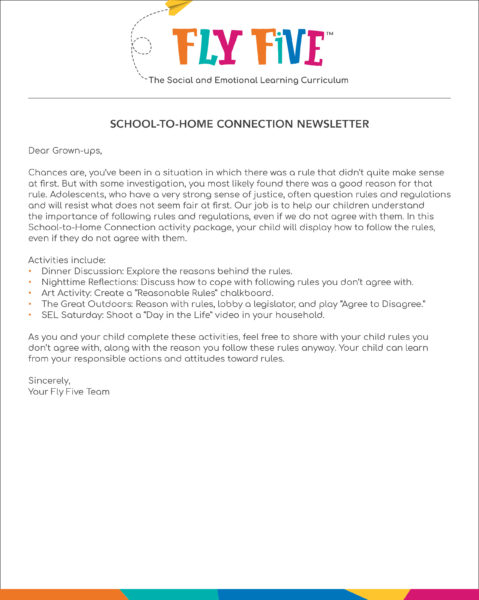Classrooms and playgrounds provide the perfect setting in which to practice the social and emotional competencies critical to students’ success. Likewise, a students’ home environment offers plenty of practice in cooperation, assertiveness, responsibility, empathy, and self-control as students navigate the unique social and emotional dynamics present there. Ideally, schools and families will form strong partnerships and can leverage the learning happening in both environments to strengthen students’ success. Despite data that shows that “[s]kill sets (whether social, emotional, or academic) are enhanced when they are mutually supported and reinforced at home and at school” (Albright, Weissberg, & Dusenbury, 2011), the gap between home and school is often wide enough that social and emotional learning doesn’t always pass back and forth with ease.
In response to this data and to research showing that SEL curricula that include a home-school partnership results in “positive outcomes on children’s social skills, attitudes, and school performance” (Albright, Weissberg, & Dusenbury, 2011), Fly Five, the social and emotional learning curriculum from Center for Responsive Schools, includes a home-school partnership throughout the curriculum. The School-to-Home Connection is a set of online resources that will communicate and connect the SEL skills students are exploring in the classroom with their caregivers at home. Fly Five’s approach to building a positive school-to-home partnership for SEL includes the following components.
Each Monday, teachers will send home an email or print copy of the School-to-Home Connection (SHC) newsletter. The newsletter is filled with activities, readings, and suggestions for outings that bring social and emotional learning from the classroom to a student’s home. Through collaborative learning and insightful discussions, students and their families practice targeted SEL skills aligned with that week’s lesson. The SHC prompts are engaging and easily integrated into a family’s daily routine. These activities are meant to be flexible for families. Each day’s category takes 10–15 minutes, with the exception of SEL Saturday, which may take between a half day and a full day.
Besides learning about the social-emotional skills students are exploring in their classrooms, caregivers will also have access to several different ways to foster these skills at home with their students.
Dinner Discussion offers families thoughtful questions and relevant tips for a guided conversation with their child about the SEL theme of the week. The open-ended questions allow students to think deeply about why their SEL skills are important and draw conclusions based on their experiences. The tips give parents and guardians clear, encouraging language to foster a meaningful discussion and positively reinforce a student’s classroom learning in the context of the home.
Nighttime Reflections are a series of prompts that support SEL growth for a variety of learning styles. For younger students, the Nighttime Reflections offer an interactive activity or a read-aloud, both of which provide space to make connections and explore real-life challenges through guided play. For older students, the Nighttime Reflection prompts can be reflected upon as a journal entry, a guided discussion, or a reflect-and-sketch. Each of these activities gives students the chance to reflect on their experiences and deepen their understanding of their SEL skills with the flexibility of using the form that will best support their learning.
Art Activities provide students a chance to explore their SEL skills in a fun and creative way. The projects range from activities that help students express themselves to suggestions for creating homemade tools to help them stay focused and accountable. Each Art Activity needs only a few basic supplies and a little bit of space and time for students to begin their creative exploration.
Community Connections activities help to broaden a student’s perspective and understanding of how to be a contributing member of a community. Through the explorations in Community Connections, students practice key skills such as working with others to complete a challenging task and taking the initiative to solve a problem in the community. Students will expand their understanding not only of how their SEL skills can be applied in a larger context but also how their actions have the potential to positively impact their environment.
SEL Saturday encourages students to take the lead planning projects such as community initiatives or personal challenges to help them grow their SEL
skills in a larger context. These activities are broad in scope and give students the chance to think creatively, collaborate with the adults in their lives, and practice researching and taking actionable steps to execute their ideas. The fruits of their SEL Saturday labor will allow students to witness how using their SEL skills in a project-focused, sustained manner can have a positive impact for themselves as well as for their family and community.
Fall is a perfect time to pause, evaluate your school’s current approaches to partnering with families, and consider opportunities to strengthen those relationships. Fly Five’s School-to-Home Connection offers one example of how to do just that. What is your next step?
References
- Albright, M. I., Weissberg, R. P., & Dusenbury, L. A. (2011). Schoolfamily partnership strategies to enhance children’s social, emotional, and academic growth. Newton, MA: National Center for Mental
- Health Promotion and Youth Violence Prevention, Education Development Center, Inc.

